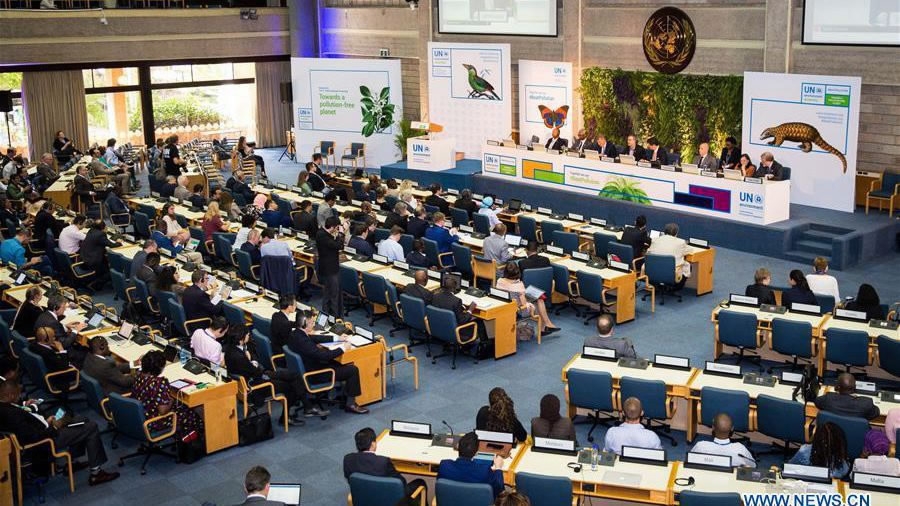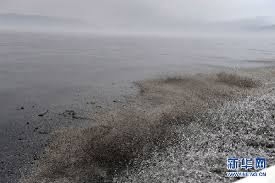
Tech & Sci
16:39, 07-Dec-2017
Amid UN commitment to plastic ban, Kenya wins praise
Alok Gupta

Amid declarations to stop the flow of plastic into the ocean, which was signed during the third United Nations Environment Assembly (UNEA) on pollution, and attended by nearly 100 countries, host Kenya emerged as an example of how to efficiently ban plastic bags.
Kenya banned the sale, use, and manufacture of plastic bags early this year.
In a side-event during the Assembly, Kenya explained how the ban was implemented to delegates from various countries. Mohamed Atani, regional communication officer of UNEP Africa told CGTN that, unlike other countries, the ban on plastic bags in Kenya is not ornamental.
"[The] plastic bag ban is being implemented efficiently across the country. Many countries have shown their eagerness to learn from Kenya on how to enforce the ban," Atani said.

China has stepped up efforts to adopt comprehensive measures to prevent and control marine pollution. /Xinhua
China has stepped up efforts to adopt comprehensive measures to prevent and control marine pollution. /Xinhua
He added that the ban was, in fact, a bottom-up approach and has massive support from the people. "This ban will soon create a plethora of green jobs, opening up the possibility for manufacturing sustainable bags made from cloth or other reusable materials."
Erik Solheim, head of the United Nations Environment Program, lauded the efforts of the Kenyan government for not only drafting legislation to end plastic pollution but also implementing it on a national level.
"Lots of people were saying can we do it or can't we, but the Kenyan government did it," he said.
Ban on plastic, but it's not binding
On Wednesday, the concluding day of the UN environment ministers meeting in Nairobi, a document was signed to end the flow of plastic into the oceans. However, Scientists and activists who have spent years advocating for the ban appeared unhappy.
They claimed that the agreement is not binding on parties, and does not mention either targets or a deadline for the ban.
In a bid to placate the scientists and activists demanding a more concrete plan to end plastic litter, Vidar Helgesen, Norway's Environment Minister, told the BBC, "What we came here with was the need for action. The starting point was aiming for zero emission of marine litter. So it's effectively a breakthrough for zero emission of plastic into the ocean."
According to World Wildlife Fund (WWF), more than 8.8 million tons end up in the ocean every year. The massive plastic pollution has led to deadly consequences for marine life and the ecological balance. China, Indonesia, and the Philippines are the top three major producers of plastic waste.
While China produces nearly 8.5 million metric tons of plastic waste, Indonesia and Philippines 3.2 and 1.9 million tons of plastic waste respectively.
“We, the world’s ministers of the environment, believe that every one of us should be able to live in a clean environment. Any threat to our environment is a threat to our health, our society, our ecosystems, our economy, our security, our well-being and our very survival,” ministers mentioned in the declaration.
The Assembly also witnessed Chile, Oman, South Africa and Sri Lanka agreeing to join the Clean Seas campaign. Sri Lanka apprised that it will implement a ban on single-use plastic products from January 2018 to make its ocean and coasts pollution-free by 2030.
The UNEA Assembly in Nairobi focused on air, chemical, freshwater, land, soil, marine and waste.
Apart from controlling marine litter, including microplastics, delegates also focused on steps to reduce air pollution, cut out lead poisoning from paint and batteries, protect water-based ecosystems from pollution, deal with soil pollution, and manage pollution in areas hit by conflict and terrorism.
“We already have much of the knowledge and technical solutions we need to prevent, mitigate and manage pollution,” said António Guterres, United Nations Secretary-General.

SITEMAP
Copyright © 2018 CGTN. Beijing ICP prepared NO.16065310-3
Copyright © 2018 CGTN. Beijing ICP prepared NO.16065310-3